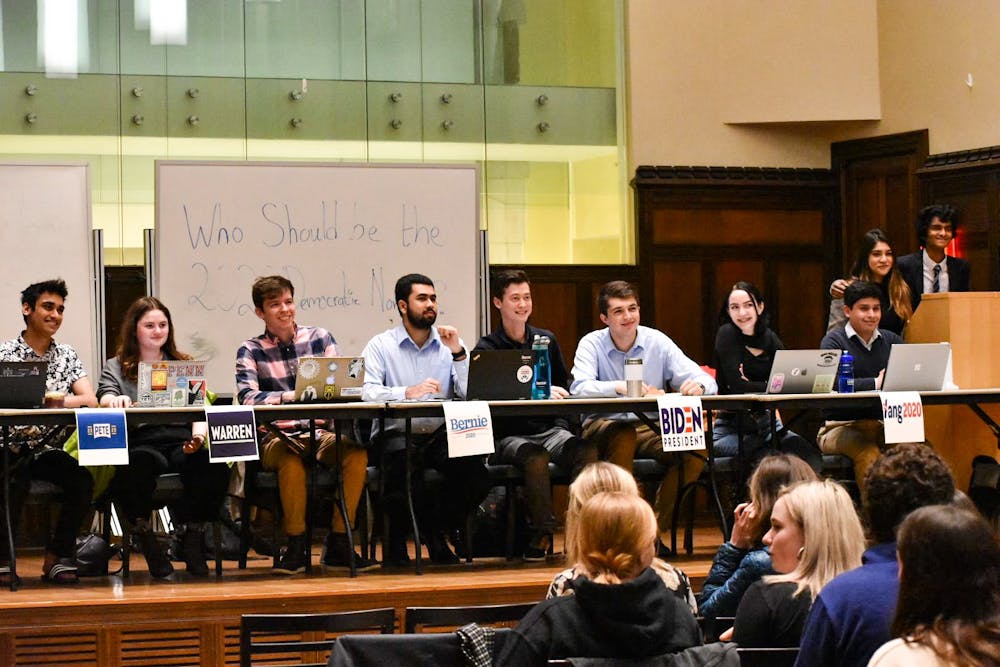
Five Democratic candidates were represented at the parliamentary-style debate in the ARCH building.
Credit: Samantha TurnerTonight, the leading Democratic presidential candidates will debate in Las Vegas before the Nevada caucuses. Meanwhile, Penn students debated on Tuesday night to advocate for their favored 2020 presidential candidates.
The parliamentary-style debate took place in the ARCH building and was hosted by Penn Democrats, Penn Government & Politics Association, and Penn Asian American Pacific Islander Politics in front of around 50 student spectators.
Eight student speakers came from on-campus candidate advocacy groups, including two representatives from Penn for Biden and Penn for Bernie, and one from Penn for Warren and Penn for Pete. Two students also spoke on behalf of Andrew Yang, although the entrepreneur officially dropped out of the race last week.
During the debate, Penn GPA moderators asked each team to address their candidate’s holistic qualifications for the presidency and their candidate's positions on immigration reform, foreign policy, healthcare, and climate change.
Penn for Bernie's team highlighted the strength of Sen. Bernie Sanders' (I-Vt.) grassroots coalition and his consistent plans to provide universal healthcare and eliminate all student debt.
Supporters of Joe Biden emphasized the former vice president's experience working under the Obama administration, and stressed the practical appeal of his platform as a moderate Democrat.
Penn for Pete's debater cited the former South Bend, Ind. mayor's military experience, and the historic nature of his platform as the first openly gay man running for the presidency.
Warren's representative emphasized Sen. Elizabeth Warren's (D-Mass.) commitment to large-scale structural change for the American working class.
Penn for Bernie representatives highlighted Sanders' plans to provide universal healthcare and eliminate all student debt.
Student representatives from recently dismantled group Penn for Yang still took to the stage to support Yang's Medicare and universal basic income policies. Debate moderator and College sophomore Sumant Rao, who is also GPA vice president of external affairs, said they gave the group a platform at the debate because he believes Yang's platform and ideology is unique and still relevant to the remaining candidates' political discourse.
Throughout the night, debaters were respectful of each other's positions, despite their ideological differences.
The most emotional point in the evening occurred when debaters tackled their candidate's stance on the current immigration crisis.
Penn for Bernie representative and Wharton and College senior Jay Vaingankar spoke on the importance of abolishing Immigrations and Custom Enforcement, and earned applause from the audience as he referenced his upbringing as a son of immigrants in a New Jersey sanctuary city.
“I’ve witnessed with my own eyes under both the Trump and Obama administrations, ICE coming to my neighborhood to separate families and deport parents,” he said.
Penn for Pete representative and Wharton sophomore Manoj Simha, who referenced his first-hand experience immigrating from India to the United States as a teenager, advocated for Buttigieg. He cited Buttigieg's comprehensive plans to revamp the immigration system, work with global organizations such as the UN, and secure more money to meet the influx of incoming refugees.
“Immigration is the core of this nation, and as an immigrant myself I can attest to that,” Simha said to the audience.
Although Andrew Yang officially dropped out of the race last week, two students came to support his medicare and universal basic income policies.
Rao said he thought the event went well and managed to promote discourse in an equitable way.
"Our goal was to put all of these people from diverse ideologies and diverse campaigns together in one room, have a dialogue about the important issues facing both young people and people in general," Rao said.
To prepare for the debate, Rao and fellow debate co-moderator College sophomore Amira Chowdhury began with a list of 30 possible question topics, and said they whittled the list down to key issues popular among on-campus activists, in the media, and in past Democratic debates.
“Something that was present among each representative was their passion and the knowledge driven from that passion,” said Chowdhury, who also serves as director of Penn AAPI Politics.
After the debate, Simha and Vaingankar urged Penn students to not only vote, but to be aware of their privilege when thinking about community issues.
“We should also recognize that as a product of being on a campus and not having been really introduced to the real world yet, that we come from certain biases and understandings of society that may be out of touch with people experiencing issues in their day-to-day life,” Simha said.
Penn student on-campus voter turnout has increased substantially in the past four years. Student political groups and nonpartisan groups such as Penn Leads the Vote still seek further voter engagement this year from all sectors of the Penn community.
“Getting out of the Penn bubble, knocking on doors, making phone calls in communities that have felt ignored and left behind, and bridging the gap with empathy will increase turnout in this city alone,” Vaingankar said.
The Daily Pennsylvanian is an independent, student-run newspaper. Please consider making a donation to support the coverage that shapes the University. Your generosity ensures a future of strong journalism at Penn.
Donate




